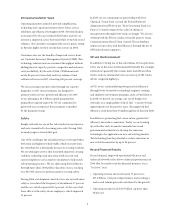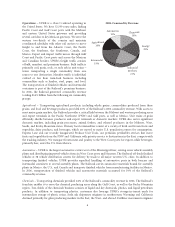Union Pacific 2006 Annual Report Download - page 13
Download and view the complete annual report
Please find page 13 of the 2006 Union Pacific annual report below. You can navigate through the pages in the report by either clicking on the pages listed below, or by using the keyword search tool below to find specific information within the annual report.network capacity, dramatic and unplanned increases of demand for rail service in one or more of our commodity
groups, or other events that could have a negative impact on our operational efficiency, any of which could have a
material adverse effect on our results of operations, financial condition, and liquidity.
We May Be Subject to Various Claims and Lawsuits That Could Result in Significant Expenditures – The nature of
our business exposes us to the potential for various claims and litigation related to labor and employment,
personal injury, property damage, environmental liability, and other matters. Any material changes to litigation
trends or a catastrophic rail accident or series of accidents involving any or all of property damage, personal
injury, and environmental liability could have a material adverse effect on our results of operations, financial
condition, and liquidity.
We Are Required to Transport Hazardous Materials – Federal laws require railroads, including UPRR, to transport
hazardous materials. Any rail accident involving the release of hazardous materials could involve significant costs
and claims for personal injury, property damage, and environmental penalties and remediation, which could have
a material adverse effect on our results of operations, financial condition, and liquidity.
The Availability of Qualified Personnel Could Adversely Affect Our Operations – Changes in demographics, training
requirements, and the availability of qualified personnel, particularly engineers and trainmen, could negatively
impact our ability to meet demand for rail service. Unpredictable increases in demand for rail services and a lack
of network fluidity may exacerbate such risks, which could have a negative impact on our operational efficiency
and otherwise have a material adverse effect on our results of operations, financial condition, and liquidity.
We Are Subject to Significant Governmental Regulation – We are subject to governmental regulation by a
significant number of federal, state, and local authorities covering a variety of health, safety, labor, environmental
(as discussed below), and other matters. Our failure to comply with applicable laws and regulations could have a
material adverse effect on us. Governments may change the legislative or regulatory frameworks within which we
operate without providing us with any recourse for any adverse effects on our business. Economic re-regulation of
the rail industry would negatively impact our ability to determine prices for rail services and reduce capital
spending on our rail network, resulting in a material adverse effect on our results of operations, financial
condition, and liquidity. Also, some laws and regulations require us to obtain and maintain various licenses,
permits, and other authorizations, and we cannot guarantee that we will continue to be able to do so. In addition,
one or more consolidations of Class I railroads could lead to future re-regulation of the rail industry.
Severe Weather Could Result in Significant Business Interruptions and Expenditures – Severe weather conditions,
events, and other natural phenomena, including earthquakes, hurricanes, fires, floods, extreme temperatures, and
significant precipitation may cause business interruptions, including line outages on our rail network that can
adversely affect our entire rail network, and result in increased costs, increased liabilities, and decreased revenue,
which could have a material adverse effect on our results of operations, financial condition, and liquidity.
Strikes or Work Stoppages Could Adversely Affect Our Operations as the Majority of Our Employees Belong to Labor
Unions and Labor Agreements – We are a party to collective bargaining agreements with various labor unions. In
January 2005, we began the current round of negotiations with the unions. Disputes with regard to the terms of
these agreements or our potential inability to negotiate acceptable contracts with these unions could result in,
among other things, strikes, work stoppages, or other slowdowns by the affected workers. If unionized workers
were to engage in a strike, work stoppage, or other slowdown, or other employees were to become unionized, we
could experience a significant disruption of our operations or higher ongoing labor costs, either of which could
have a material adverse effect on our results of operations, financial condition, and liquidity. Additionally, future
national labor agreements, or renegotiation of labor agreements or provisions of labor agreements, could
compromise our service reliability and significantly increase our costs for healthcare, wages, and other benefits,
which could have a material adverse impact on our results of operations, financial condition, and liquidity.
7
























